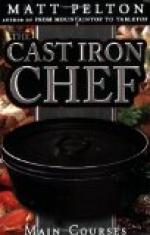“Standing so, he didn’t seem to breathe. But the crowd were breathing for him. From the seats behind him Cogan could hear, almost feel, their hot breaths.
“The bull now stopped and studied this last enemy. The others had come at him in groups, but here was one all alone.
“The bull stood with half-lowered head, weaving it from side to side, like when from behind the barrier he first appeared to the crowd. He eyed the red cape. It must have flamed like blood in the sun to him. His nostrils, his eyes, were flaming like blood, too. He ceased his weaving, raised, lowered his head, and bounded toward Torellas. And everybody there knew that it was the bull or the matador this time. The red cape of the matador seemed to leap forward, no loose ends now for a flying horn to catch, but a tight roll around the matador’s left forearm. Standing now four feet away Torellas, to blind the charging bull as the capeadors had done, had to step close in. And now he was close in and his forearm was across the bull’s forehead. It was hard to follow, the action was so fast, but Cogan saw that Torellas was already between his horns. Cogan looked for the flash of the heavy blade, but already Torellas’ right arm had gone forward, that eye of his had marked the little vital spot, and, as the bull lowered his head and lunged to gore him, the blade was driven forward, and onto the point of it rushed the bull. The blade went home—clear to the hilt—eighteen inches or so. Before the people could clear their choked-up throats to applaud, before many could realize what had happened, the bull was stumbling to his knees and Torellas was unwrapping the cape from his left forearm. One long, thundering in-and-out breath and they were mobbing Torellas with applause.
“The bull rolled from side to side on his knees, tried to balance himself there for four, five, six seconds, and then rolled over. He half lifted his head from the sand, he kicked, once, twice, again, and then the head fell back, a quiver, and he lay limp. It was sad in a way.
“A bugle rang out. Two Peruvian boys came galloping in on horses. The bugle sounded again, they took a bridle hitch on the bull and went galloping out of the ring, bugles going and the bull dragging behind. The noise and whirl of it made Cogan think of a fire-engine coming down the middle of a street up home.
“As the bull was hauled out, Cogan felt a new sorrow for him. Up to that last stroke there was a chance that he would hurt somebody, but he hadn’t killed or hurt anybody, and now, when he was dragged out dead, Cogan felt half sad. And he said as much to Ferrero.
“Ferrero looked at him puzzled. ’Such ideas you have in your country? Why? Leesen now, my friend, I also have a sadness, but consider if you was a bull, or I was a bull. Would you prefair to go to your death in a bull-ring or to be led to a man who demolished you on the temple with an axe, or cut your throat with a long knife—a man in a white garment? Which?’




